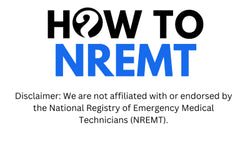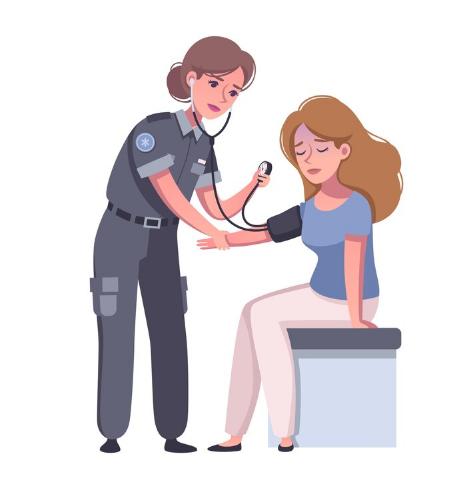The EMS testing world shifted in 2025 and that shake-up is real. Students are asking: “Do I need more than standard EMT training for the new exam format?” If you’re preparing for the NREMT cognitive exam, you've likely noticed the changes: interactive questions, motion-based scenarios, and data-based decision points.
Standard EMT training still gives you strong ground, but now, passing requires more than basic knowledge. It demands fluid thinking, clinical judgment, and the ability to adapt fast. That’s why EMT training for new exam pathways alone may not be enough.
We’re here to guide you. We’ll show when to lean on NREMT practice exams, when a NREMT prep course makes a difference, and where EMT tutor support pays off.
1. What Changed in 2025?
Major shake-ups came with the update:
·Technology Enhanced Items (TEIs) now appear in EMT, AEMT, and Paramedic exams—no more multiple-choice only.
·Domains shifted to Scene Size-Up, Primary Assessment, and more, reflecting real call flow.
·New timelines and updated content put real-world decision-making front and center.
That means your study path should change too. The question is, how much extra is actually helpful?
2. Standard Training vs. Extra Prep
Standard EMT training programs give you the basics. You'll learn vital signs, primary and secondary assessments, patient transport techniques, and general emergency protocols. These programs check all the boxes your state or national registry requires.
Here’s the reality: the 2025 NREMT exam isn’t just testing facts anymore. It’s testing how you think in motion, under pressure, and in unpredictable situations.
Most classroom-based courses still rely heavily on lecture-style teaching and paper-based testing. That’s fine for the classroom but not for a computer-adaptive test loaded with Technology Enhanced Items (TEIs) like drag-and-drop tasks, build lists, and multi-step clinical judgment simulations. These require fluid reasoning and fast, confident choices.
If your EMT course doesn’t include hands-on TEI drills, simulated NREMT exam scenarios, or cognitive coaching, you're likely walking into the exam half-prepared.
Here’s how each prep method compares:
|
Training Type |
Strengths |
Gaps |
|
EMT Course |
Covers knowledge, skills lab, protocols, and scenarios |
Often lacks test strategy, TEI training, and clinical judgment coaching |
|
NREMT Practice Exams |
Mimics test pressure, reveals weak spots, boosts endurance |
Offers no feedback unless paired with coaching; doesn’t build reasoning on its own |
|
Prep Course / Tutor |
Focused guidance, TEI simulations, scenario training, accountability |
Higher upfront time and cost investment—but pays off in confidence and results |
Think of it this way: standard training teaches you what to do. Extra prep teaches you how to think while doing it. That difference is what separates test passers from test repeaters in 2025.

3. When an NREMT Practice Exam Helps
NREMT practice exams are more than mock tests; they’re powerful diagnostic tools. These tests help you uncover weak areas, get comfortable with the NREMT cognitive exam structure, and build the mental endurance needed to handle the full exam.
Many EMT students make the mistake of treating practice exams as simple quizzes. They take one, look at the score, and move on. That’s not how to study for NREMT effectively.
You have to break the test apart. That means reviewing not just the questions you got wrong, but also the ones you got right for the wrong reasons. Understanding the “why” behind each answer is where the real growth happens.
We recommend:
·Scheduled practice sessions – at least 2–3 times per week leading up to your test date
·Post-test breakdowns – review every single question, even the correct ones
·Pattern tracking – log mistakes and recurring content gaps (e.g., pediatric dosing, cardiac rhythms)
·Simulated testing conditions – practice sitting through a full-length exam without distractions
·TEI-specific drills – use practice platforms that include build lists, drag-and-drop, and multi-select items
Also, if you're working with an EMT tutor, go over your practice test results together. A good tutor will teach you to think like the test; not just memorize answers. This transforms each test from a score-chasing exercise into a real prep strategy.
4. Does Everyone Need a Prep Course?
A full NREMT prep course includes live coaching, TEI-focused drills, and reasoning walkthroughs. Whether you need one depends on your learning style.
You should definitely use one if:
·You’ve failed before
·You struggle with test anxiety or critical thinking
·You want structure mixed with confidence
It’s not required but it speeds up learning and helps prevent retakes.

5. The Role of an EMT Tutor
A dedicated EMT tutor is not just someone who explains content; they reshape how you think. Especially after the 2025 exam changes, tutoring has become less about memorization and more about sharpening clinical judgment.
Let’s be honest: trying to prep alone can feel like guesswork. You’re never quite sure what you're missing. That’s where a tutor steps in. They bring structure, accountability, and targeted feedback, exactly what most test-takers lack.
Here’s what a good EMT tutor can offer:
·Rhythm and ECG interpretation practice — not just flashcards, but real conversations about waveforms, rhythms, and interventions.
·Scenario walkthroughs — breaking down multi-step questions, reviewing the patient’s condition, and walking through how to prioritize care.
·Pattern correction — noticing things like how you misread vitals, miss distractors, or overthink straightforward items.
·Test anxiety coaching — calming strategies, pacing practice, and confidence-building exercises to help you stay clear-headed on test day.
·Real-time error spotting — instead of reviewing 100 questions later, your tutor can catch flawed logic as it happens.
Tutors are especially helpful for retesters but they’re also a major edge for first-time candidates who want structure and expert oversight. Also for students who’ve been out of the classroom for a while, an EMT tutor can help rebuild that academic muscle.
If your EMS class felt rushed or overwhelming, tutoring fills in the gaps. It’s personalized prep, designed around how you learn, not just what’s on the exam.
6. How to Study Effectively
To weave all these tools into your plan, here’s what to do:
|
Week |
Focus |
Tools Involved |
|
1–2 |
Build timing and rhythm recognition skills |
TEI drills, rhythm flashcards, CAT simulations |
|
3–4 |
Simulate real calls |
Scenario drills, tutor sessions |
|
5–6 |
Full EMT knowledge review |
Practice tests + prep course modules |
|
7 |
Test-day readiness |
Timed mock tests, anxiety/strategy coaching |
|
Test Day |
Calm, confident, ready |
Bring confidence, not just knowledge |
7. What About Cost & Time?
Extra training means more time and money. Ask yourself:
·Can I budget a few extra hours weekly?
·Would one-on-one tutoring help me pass faster?
·Is avoiding a retest worth the cost?
Our support ends up saving both money and stress in many cases.

8. Real Results
Here’s what really matters: passing the NREMT on your first attempt.
We’ve worked with thousands of students and the data is clear. Students who go through basic EMT training alone often walk into the NREMT underprepared, especially with the updated 2025 format. However, those who pair their coursework with a structured NREMT prep course, consistent NREMT cognitive exam practice, and tutoring support see a dramatic difference.
In fact, students in our programs saw a 50% higher first-time pass rate compared to those who didn’t use any outside prep. That’s not a minor bump; it’s a game-changer.
We’re not talking about students who already had an edge. Many were anxious, coming from accelerated programs, or had been out of school for a while. Some had even failed before, but with clear test strategies, targeted practice, and real-world scenario drills, they didn’t just pass, they walked into the exam confident.
Here’s what these students did differently:
·Practiced with new TEI formats before ever seeing them on the test.
·Worked through realistic scenarios instead of just memorizing facts.
·Used feedback from tutors to fine-tune clinical judgment.
·Focused on how to study for the NREMT, not just what to study.
If you're wondering whether the extra effort is worth it, these results speak for themselves. In a test this important, smart preparation matters more than ever.
FAQs
Q: Can I pass without extra prep?
A: Technically yes, but added training boosts your chance and reduces anxiety.
Q: How long does the prep take?
A: A well-structured 4–6 week plan integrates content, TEIs, and reasoning.
Q: Are TEIs really that different?
A: Yes, they require logical sequencing and tool use, not just recall.
Q: What if I fail?
A: A prep course and EMT tutor can help identify weaknesses and remove blind spots.
Deciding how much prep you need depends on your previous performance, test confidence, and how deep you want to go. 2025 is here—make sure you’re ready to pass.

How To NREMT Can Help You Pass in 2025
We’ve built a full support system:
Live NREMT cognitive exam practice drills
Branded NREMT cognitive exam format sim sessions
Dedicated EMT tutor support
Case-response TEI mechanics
Structured EMT training for new exam plans
If you're ready to gain confidence and pass on your first try, join us today and let’s get started.

